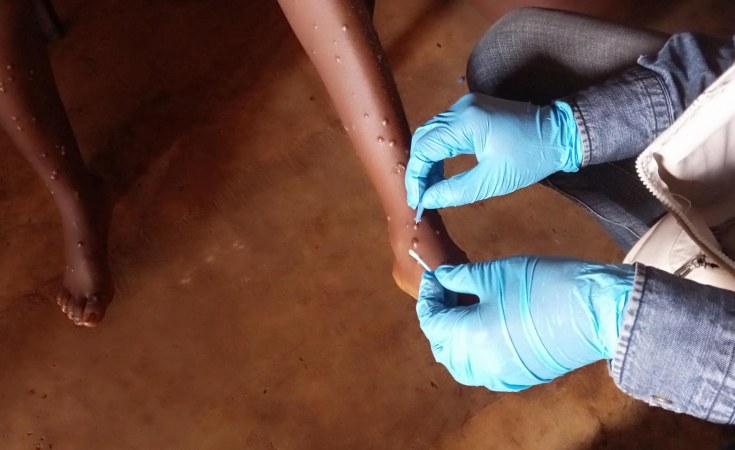The Democratic Republic of Congo, the epicentre of an mpox outbreak, it to receive its first delivery of vaccines, with 100,000 doses to arrive on Thursday, and a second batch on Friday.
The World Health Organization declared mpox a health emergency last month, but efforts to curb the spread of the disease have been hampered by a lack of vaccines.
DR Congo is Africa's worst affected country, with more than 19,000 suspected cases of mpox and more than 650 deaths recorded since the start of the year, according to health authorities. Sixty-two percent of infections are among children.
The first shipment of vaccines - manufactured by Bavarian Nordic and donated by the European Union - will arrive in DRC from Denmark on Thursday, with another delivery of 100,000 doses on Friday.
The 200,000 doses will then be distributed between Goma, Lubumbashi and the Congolese capital Kinshasa.
"There's a distribution plan and a vaccination plan, which includes all those who have been infected, as well as contact cases and contacts of contacts," Jean Kaseya, head of the Africa Centres for Disease Control and Prevention (CDC) told RFI.
Priority will be given to health workers and immunocompromised people such as those suffering from malnutrition or HIV-positive.
Negotiations for the vaccines, secured through Europe's Health Emergency Preparedness Response Authority (HERA), have been finalised and the aim is to acquire 10 million doses quickly.
"The vaccines are expensive but the technology will be transferred to African from 2025," Kaseya said. "They will be produced in Africa with a cost reduction of around 85-90 percent."
To display this content from X (Twitter), you must enable advertisement tracking and audience measurement.
Accept Manage my choices Hefty challenge
Health authorities face a tough challenge launching the vaccination campaign across a country the size of western Europe.
The doses must be kept in cold storage and communities can be wary of participating.
"The vaccine will not be distributed as soon as it is received," Cris Kacita, head of Congo's mpox outbreak response told Reuters news agency, explaining why it would take around a month from delivery to launch the campaign.
"We need to communicate so that the population accepts the vaccination," he said, adding that the six targeted provinces had capacity to store the doses at the required temperature.
While children are at high risk from mpox, Bavarian Nordic's shot is not licensed for children.
However, the WHO's acting director of epidemic and pandemic prevention Maria Van Kerkhove said the WHO recommends its use in outbreaks for children when the benefits outweigh the risks, and this is currently under discussion in Congo.
Mpox - previously known as monkeypox - typically causes flu-like symptoms and pus-filled lesions, and can kill.
It spreads through close contact, including sexual contact.


